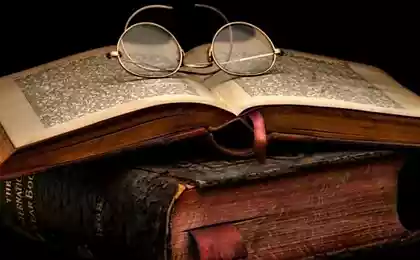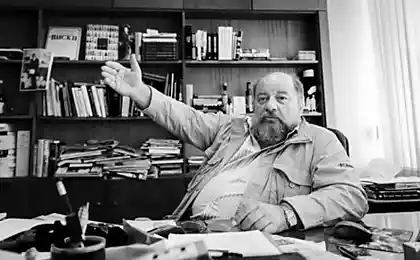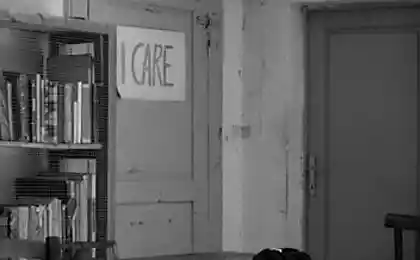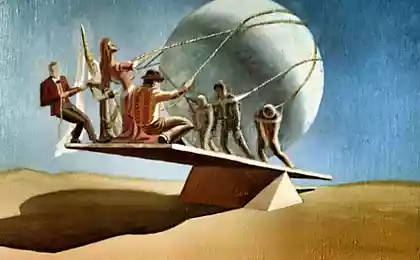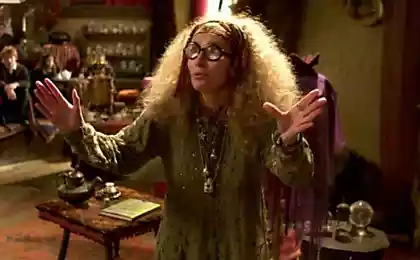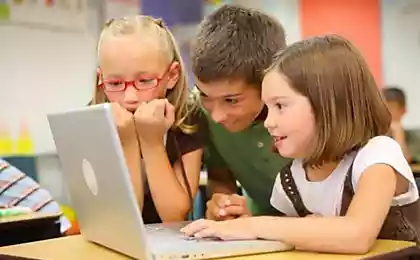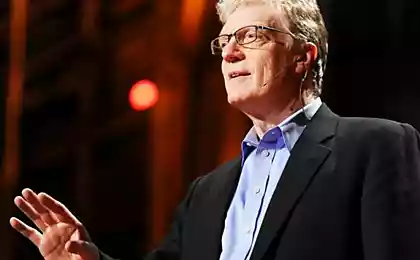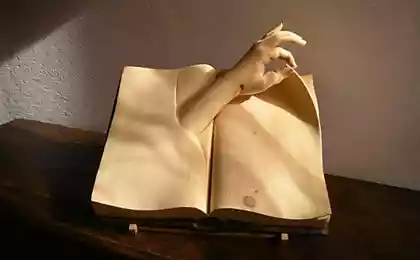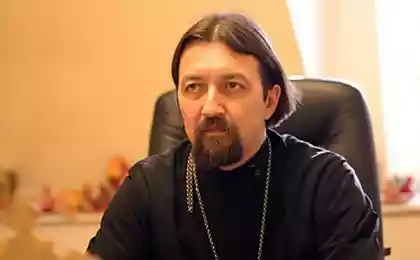847
10 most influential books about education
How do we know what is education and what should it be? Everything that people wrote and thought on the subject, cannot be reduced only to several book volumes.
But some books are of particular importance for pedagogy and history of education. Behind them stretches a long train of influences and interpretations. They still determine what we think about education, its objectives and values, they still affect what and how we teach our children.
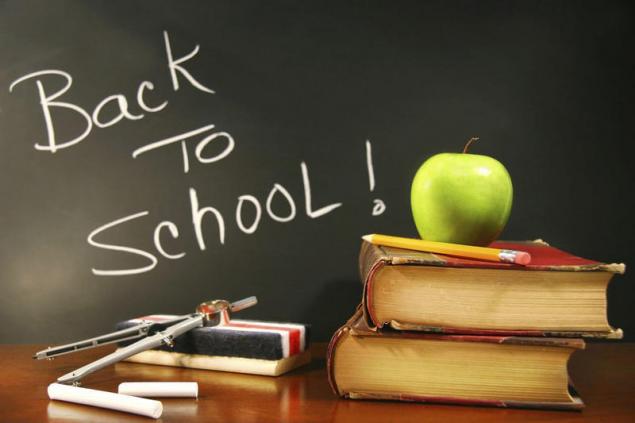
John Maynard Keynes once said "Practical men, who believe themselves to be quite exempt from any intellectual influence, are usually the slaves of some defunct economist." Theorists of education, we can say almost the same thing: what you do not read them, does not necessarily mean that you do not follow their ideas.
We have compiled a list of the most influential books on which was based the educational theory and practice in the last century. Some of these works already are not familiar to the General public, but they today continue to define our thoughts about learning and education.
1. Jean-Jacques Rousseau — Emile, or On education (1762)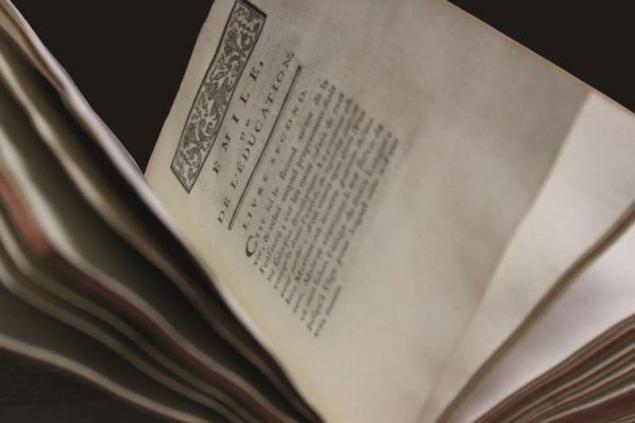
Main ideas: the child as a "blank sheet", nature education, special character of childhood and the depravity of civilization
"Emil" is a novel-a treatise on growing up and parenting, the impact of which stretches far beyond the pedagogical sphere. In this book Rousseau, in essence, describes an imaginary pedagogical experiment. His main character must go through training while remaining healthy, independent and free man. Since outside public institutions are hopelessly corrupted, teacher and student should stay away from them.
Education should develop and improve the natural impulses and inclinations, and not to distort them.Here appears for the first time in such a vivid form of the image of the child as pure and innocent beings and the image of childhood as a special period of life, so characteristic of European culture. Russo blames those who are "constantly looking for the adult child, not thinking about what it is before becoming adults" and encourages:
Love the childhood be attentive to to its games and entertainments, to its lovely instinct!.. Why would you want to deprive these innocent babies the opportunity to enjoy a time, so quick and so fast they are going, this precious boon, to abuse whom they do not know how?
After the book, many mothers began to breast-feed babies, not to give the nurses, let them run barefoot through the yard, and even to attach to manual labor. There are special educational institutions, inspired by Rousseau, and his book laid the Foundation for the pedagogical theory in the years ahead, though constantly criticized.
2. Johann Pestalozzi — How Gertrude teaches her children (1801)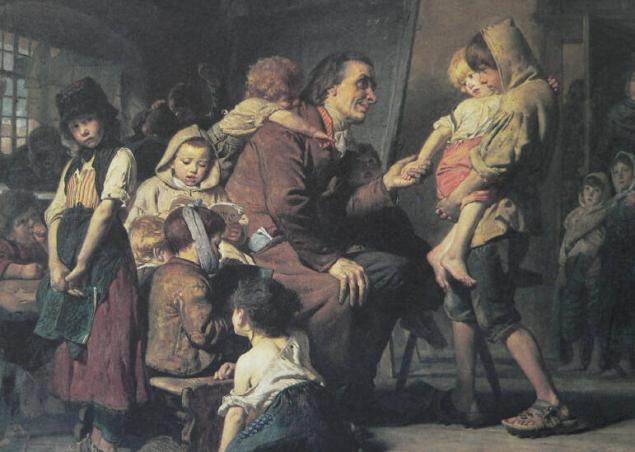
Key ideas: developmental education, natural education, the mother as the main conduit of educational values.
This Swiss thinker can be considered one of the fathers of modern pedagogy. He formulated a comprehensive educational concept aimed at "the formation of man," in which knowledge is inseparable from ethical standards and principles.
The aim of education should be harmonious development of personality, the main principle — harmony with nature, the basic method of exercise and play.Many of the ideas that we accept as a given, was first formulated by Johann Pestalozzi. One of the most important is the idea of developing training. The child is not just learning some of the truth, and learns through action and reflection. Therefore Pestalozzi angrily criticizes the abstract book education, which gives food for thought, but only gives the appearance of understanding:
About our age!... Your writing... you have introduced a child into the world of illusory concepts, which gave his mind a blank, devoid of any substantive basis to the words imaginary and illusory significance, with the result that killed the real importance which must have been in his mind to possess the things themselves.
Software product Pestalozzi was the book "How Gertrude teaches her children." It bears the subtitle "an Attempt to give the mothers instruction as to educate their children." The paper outlines the methods of education, which soon found its way into many schools in Europe and the United States, and the influence of the ideas of Pestalozzi's pedagogical theory and practice continues to this day.
3. Herbert Spencer — Education intellectual, moral and physical (1861)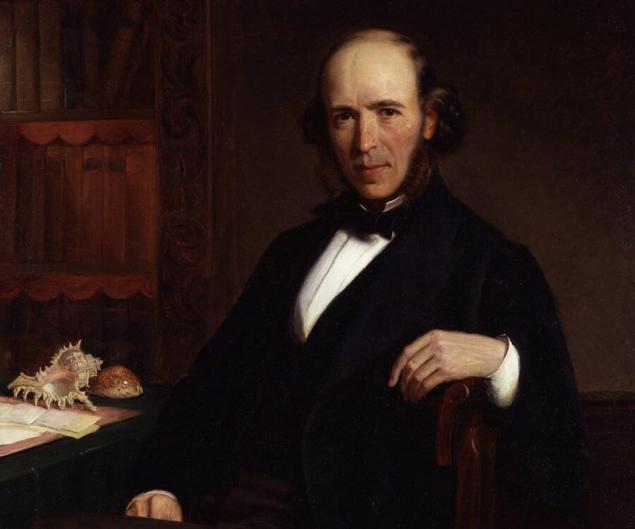
Main ideas: education as preparation for public life, the importance of science, rationality as a core value.
English philosopher and educator Herbert Spencer is now known primarily as one of the founders of sociology and theorist of evolutionism, but at the time of his pedagogical ideas have enjoyed a noticeable influence.
Spencer was literally horrified by how poorly education is associated with life's difficulties and challenges. From the sublime classic of the samples had to come down to earth: to teach children to earn a livelihood, to monitor their own health, to serve his family, to fulfill social and political responsibilities. What Spencer has formulated a statement which later became an axiom for pedagogy:
To prepare us for a full life is a task that should carry the education.In other words, education should be geared to the practical needs "of man and of the citizen" living in a modern society. The path of parenting — from simple to complex and from concrete to the abstract. Ideal for Spencer is a scientific education based on logic and rationality. These views and found expression in the book "Education...", which withstood many editions, was translated into many languages and was widely used in the preparation of teachers.
4. Louisa Alcott — Little women (1869)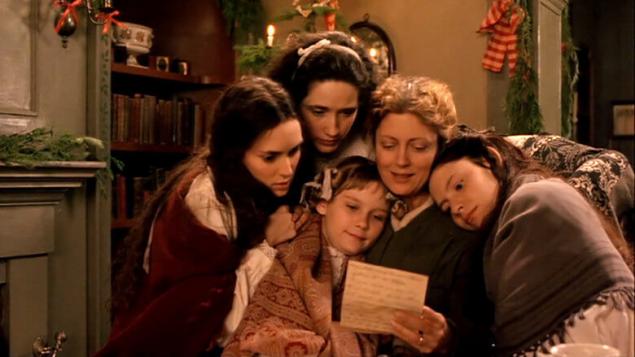
Main ideas: morality, cooperative learning and mutual assistance as the basis of education.
The name of the American writer Louisa Alcott you are unlikely to encounter in anthologies on philosophy or theory of education, but her books have sold millions of copies worldwide, has been filmed and continue to enjoy great popularity even today.
The novel "Little women" and its continuation, talks about moral education in the family March, the prototype of which was his own family, Alcott. The action revolves around home-school Plumfield attended by four teenage girls. Their training is based not on knowledge, but on personal responsibility, the ability to help each other, ability to love, to cope with difficulties and life's obstacles. Books Alcott imbued with Christian values. But they became popular in the first place due to the living language and the kind of irony the author:
— God bless girls and boys! You know, thoughtfully he added, gently patting Joe on the cheek, sometimes I think that all of you only exist in the world to fray our nerves. And yet without you, life would lose all meaning.
By 1880, Olcott was called "the most popular and prolific female writer in America." Read it all educated America, around her works has developed a whole industry. Although Alcott began to be perceived as a source of valuable teaching ideas only in the last decade, they are strongly influenced what ordinary people thought about education, upbringing, his moral values and ideals.
5. Maria Montessori the children's House. Method of scientific pedagogy (1909)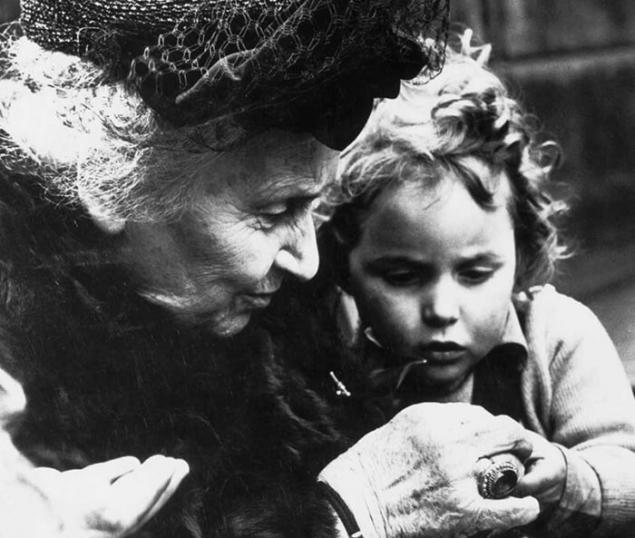
Main ideas: learning through discovery, prepared environment, the school is like a second home.
The name of Maria Montessori, perhaps, needs no special introduction: schools and methods, so named by the Italian teacher, circulated in Russia as well as worldwide.
The basic principle of pedagogy at Montessori is to provide the child with complete freedom, only guiding its development and eliminating obstacles that the child does independently. In the book "My method" Montessori sets out the basis of his educational system, by the time the last two years the test of practice. Her methods are primarily at elementary schools and education of children from 6 to 10 years. Montessori focuses on the fact that every child is a unique individual, education is a process of self-development that must take place in a specially prepared environment. Hence the model of "learning by discovery":
The secret of free development of the child that he finds his spiritual food, obeying a deep impulse, comparable with that mighty instinct which forces the newborn to drop to the breast. This invincible aspiration in the best way provides internal needs of the baby.
Work on methods Montessori suggests that we do not give the child to miss one of the sensitive periods, i.e. those periods when the child naturally and easily have acquired some kind of skills and abilities. The school must become the child's second home, a natural habitat, in which the free development of his natural aptitudes.
The concept of Montessori, like any influential idea has been repeatedly criticized (especially for the re-evaluation of the importance of special accessories and touch devices), but the importance of her work to modern pedagogical thinking nobody challenges.
6. John Dewey — Democracy and education (1916)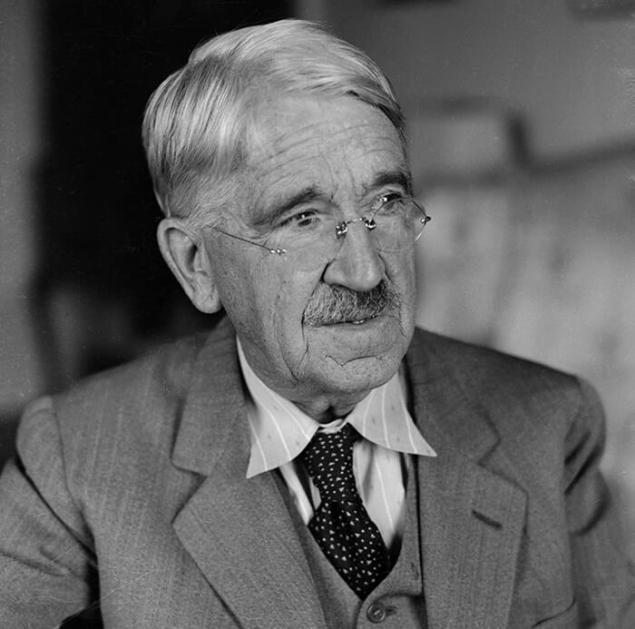
Main ideas: education as the Foundation of democracy, instrumental pedagogy, school as a society in miniature.
John Dewey is one of the most influential thinkers of the first half of the twentieth century. His views on education, politics and social processes largely still dominate our intellectual climate. The basis for these views was a pragmatism — the notion that any idea, value, or social institution rooted in the practical circumstances of human life. Truth is what is in this life practical application.
The pedagogical theory of Dewey isedit of the thesis, the opposite of Spencer's thesis: education is not preparation for life, education is life. Education should summarize the human experience and seek experience of the child, to help him to build on this base knowledge. Dewey first proposed the idea of "instrumental" pedagogy, in which the main tool of education should be meaningful action, through which the child understands the world. In addition, Dewey was one of the most outstanding defenders of democratic values, which he extended to the education system. It is the change in the school system, in his opinion, should make society more liberal and progressive:
In a democratic society the purpose of education is to give man the opportunity to continue their education, or otherwise that the purpose and reward of teaching — continuing opportunities to grow... So in our quest for education we tried to find her outside of the educational process.
Dewey's ideas influenced the educational attitudes of almost all theorists of education who lived after him, but was embodied in practice, not so much. At the same time, Dewey was the founder of one of the first pilot schools, based on democratic values. His book "Democracy and education", "Experience and education" — a classic pedagogical thought, which can't be avoided.
7. Alexander Neill — Summerhill (1960)
Main idea: the aesthetic education, the absence of coercion and self-government as the basis of learning.
British innovator in the field of education Alexander Neill in 1921 founded a school, which "adapts to a child," and not Vice versa. This school is dominated by the principles of self-government: the General issues are addressed collectively at the meetings of pupils and teachers, and the focus is not on traditional school subjects, and the aesthetic sphere.
In art'neill saw the source of imagination, creativity and emotional well-being. Most famous book, Neill, written in 1960, summarizes the main ideas of his educational philosophy. The main condition of successful education — personal freedom of the child. Punishment to him "is always an act of hatred," coercion is the worst enemy of independent thinking. The main values of education for him — not intellectualism, but a sense of inner well-being, emotional freedom and independence of a child.
We wanted to create a school where the child would be himself, which completely abandoned the observance of rules, instructions, directions, homilies, religious instruction.
After more than 40 years since the death of Alexander Neill school "Summerhill," based on his ideas, continues to work, and his views on the training system attract more and more new generations of teachers.
8. Jerome Bruner the Process of education (1960)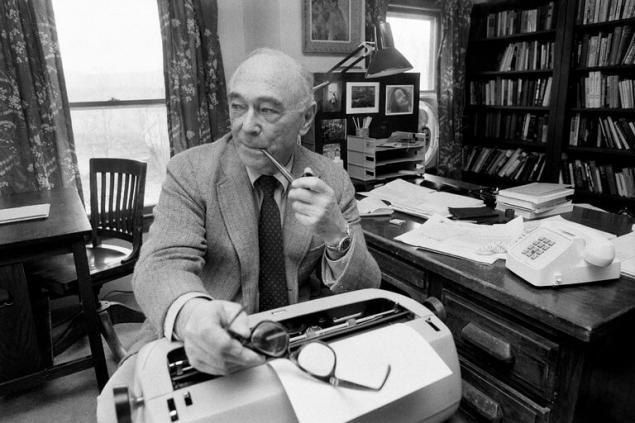
Main ideas: attention to the structure and not the content knowledge, cognitive processes as the basis of pedagogy, spiral training.
The work of this American psychologist and educator are important primarily from the point of view of how we imagine the cognitive foundations of learning. His key book is "the learning Process" written on the results, almost epoch-making scientific conference of 1959, which was attended by leading educators, psychologists, representatives of natural and social Sciences.
In this book, Bruner encourages the shift from teaching specific facts to the recognition of the importance of the structure of knowledge itself, because the understanding of "how something is folded, is much more valuable than thousands of facts about this stuff." It was proposed the famous concept of a spiral curriculum: the basic topics first appear in elementary school and then again in high school at a more sophisticated level.
Such organization of training and knowledge best fits the needs of the human mind. The main question of pedagogy then becomes how to transform the education system so that it conforms to our ideas about the human psyche and the mechanisms of cognition.
The activities of the scientist for his Desk or in the laboratory, the activity of literary criticism in the reading of the poem is an activity of the same order as the activities of any person when he is busy with such things, if he is faced with the challenge to reach understanding of certain phenomena... Schoolboy learning physics is a physicist, and it's easier for him to learn science by acting like a scientist-a physicist than doing anything else.
What Bruner became the conductor of the "cognitive revolution" in the world of pedagogical ideas. The course "Man", created under his leadership, has clearly demonstrated that advanced scientific theory really can be used at the school level, while achieving significant results.
9. Paulo Freire — Pedagogy of the oppressed (1968)
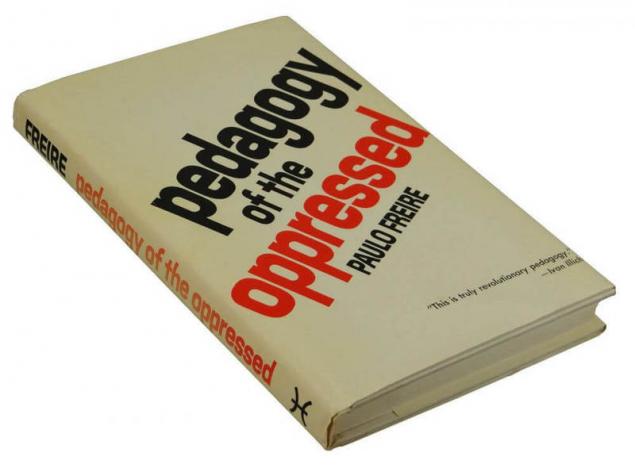
Main ideas: education as the practice of liberation, the method of awareness and critical dialogue. Paulo Freire is still the most significant representative of the critical pedagogy. Not only was he able to formulate a holistic concept of education as political action aimed at establishing equality and fighting oppression, but to bring it to life. From the point of view of the philosophy of Freire, education is a way of forming an independent, free man, able to create its own history. The pedagogical process is a process of awareness basic assumptions of culture and thinking, which enables them to critically review and change. Change the way of thinking will change reality.
Pedagogy of the oppressed needs to be invented not for the oppressed (whether individuals or entire peoples), but together with them, in incessant struggle to regain their humanity. Then the oppression and its causes will be the object of thinking themselves oppressed, opening the way to freedom.
Freire was not just an armchair theorist. He participated in the development of the national Brazilian education, which largely is based on his methods. Even if we ignore the political context in which arose the ideas of critical pedagogy, for us they remain important today.
10. Ivan Illich, the Release from schools (1971)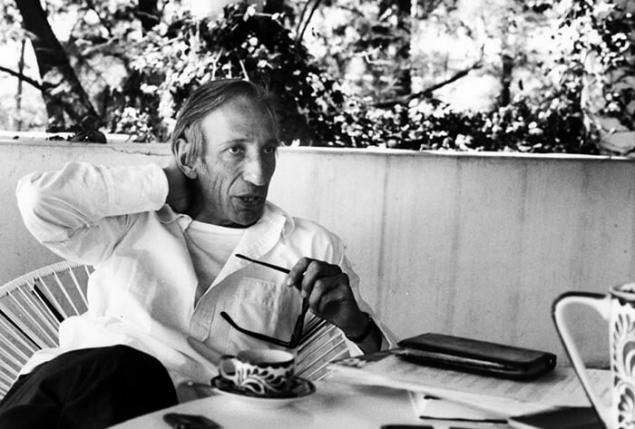
Main idea: criticism of the formal system of education, the criticism of progress as mutual exclusion, education through personal connections.
Ivan Illich, one of the most radical critics of the modern educational system. In the 1970s, years around of his books have passions. They have helped many people look at school as a state institution, who unlawfully appropriates the right to transfer the knowledge and "making" new members of society.
Education is not bad in itself, but only when it becomes a ritual and distracted the cult. If you do not need to destroy schools, to give teachers the opportunity to go beyond the school curriculum become mentors. Authentic learning becomes possible beyond formal structures and regulations, where it is artificially driven.
The school became a world religion of a modernized proletariat and gives empty promises of salvation to the poor of the technological era. National States have adopted the religion and provided a universal appeal for all citizens in the service of curriculum, consistently leading to diploma — like the ancient initiation rituals and the service of the cult.
The work of Illich have not cause such a violent reaction as several decades ago, they purchased the value of authority and quoted on the pages of prestigious publications. The school, meanwhile, is increasingly losing the monopoly on knowledge. And think of all these processes, without a book of Illich anymore.
Author: Oleg Bocharnikov
Also interesting: Education in Finland— the best in the world. How do they do it?
Why learning "old way" will no longer work
P. S. And remember, only by changing their consumption — together we change the world! ©
Source: newtonew.com/overview/most-influential-education-books
But some books are of particular importance for pedagogy and history of education. Behind them stretches a long train of influences and interpretations. They still determine what we think about education, its objectives and values, they still affect what and how we teach our children.

John Maynard Keynes once said "Practical men, who believe themselves to be quite exempt from any intellectual influence, are usually the slaves of some defunct economist." Theorists of education, we can say almost the same thing: what you do not read them, does not necessarily mean that you do not follow their ideas.
We have compiled a list of the most influential books on which was based the educational theory and practice in the last century. Some of these works already are not familiar to the General public, but they today continue to define our thoughts about learning and education.
1. Jean-Jacques Rousseau — Emile, or On education (1762)

Main ideas: the child as a "blank sheet", nature education, special character of childhood and the depravity of civilization
"Emil" is a novel-a treatise on growing up and parenting, the impact of which stretches far beyond the pedagogical sphere. In this book Rousseau, in essence, describes an imaginary pedagogical experiment. His main character must go through training while remaining healthy, independent and free man. Since outside public institutions are hopelessly corrupted, teacher and student should stay away from them.
Education should develop and improve the natural impulses and inclinations, and not to distort them.Here appears for the first time in such a vivid form of the image of the child as pure and innocent beings and the image of childhood as a special period of life, so characteristic of European culture. Russo blames those who are "constantly looking for the adult child, not thinking about what it is before becoming adults" and encourages:
Love the childhood be attentive to to its games and entertainments, to its lovely instinct!.. Why would you want to deprive these innocent babies the opportunity to enjoy a time, so quick and so fast they are going, this precious boon, to abuse whom they do not know how?
After the book, many mothers began to breast-feed babies, not to give the nurses, let them run barefoot through the yard, and even to attach to manual labor. There are special educational institutions, inspired by Rousseau, and his book laid the Foundation for the pedagogical theory in the years ahead, though constantly criticized.
2. Johann Pestalozzi — How Gertrude teaches her children (1801)

Key ideas: developmental education, natural education, the mother as the main conduit of educational values.
This Swiss thinker can be considered one of the fathers of modern pedagogy. He formulated a comprehensive educational concept aimed at "the formation of man," in which knowledge is inseparable from ethical standards and principles.
The aim of education should be harmonious development of personality, the main principle — harmony with nature, the basic method of exercise and play.Many of the ideas that we accept as a given, was first formulated by Johann Pestalozzi. One of the most important is the idea of developing training. The child is not just learning some of the truth, and learns through action and reflection. Therefore Pestalozzi angrily criticizes the abstract book education, which gives food for thought, but only gives the appearance of understanding:
About our age!... Your writing... you have introduced a child into the world of illusory concepts, which gave his mind a blank, devoid of any substantive basis to the words imaginary and illusory significance, with the result that killed the real importance which must have been in his mind to possess the things themselves.
Software product Pestalozzi was the book "How Gertrude teaches her children." It bears the subtitle "an Attempt to give the mothers instruction as to educate their children." The paper outlines the methods of education, which soon found its way into many schools in Europe and the United States, and the influence of the ideas of Pestalozzi's pedagogical theory and practice continues to this day.
3. Herbert Spencer — Education intellectual, moral and physical (1861)

Main ideas: education as preparation for public life, the importance of science, rationality as a core value.
English philosopher and educator Herbert Spencer is now known primarily as one of the founders of sociology and theorist of evolutionism, but at the time of his pedagogical ideas have enjoyed a noticeable influence.
Spencer was literally horrified by how poorly education is associated with life's difficulties and challenges. From the sublime classic of the samples had to come down to earth: to teach children to earn a livelihood, to monitor their own health, to serve his family, to fulfill social and political responsibilities. What Spencer has formulated a statement which later became an axiom for pedagogy:
To prepare us for a full life is a task that should carry the education.In other words, education should be geared to the practical needs "of man and of the citizen" living in a modern society. The path of parenting — from simple to complex and from concrete to the abstract. Ideal for Spencer is a scientific education based on logic and rationality. These views and found expression in the book "Education...", which withstood many editions, was translated into many languages and was widely used in the preparation of teachers.
4. Louisa Alcott — Little women (1869)

Main ideas: morality, cooperative learning and mutual assistance as the basis of education.
The name of the American writer Louisa Alcott you are unlikely to encounter in anthologies on philosophy or theory of education, but her books have sold millions of copies worldwide, has been filmed and continue to enjoy great popularity even today.
The novel "Little women" and its continuation, talks about moral education in the family March, the prototype of which was his own family, Alcott. The action revolves around home-school Plumfield attended by four teenage girls. Their training is based not on knowledge, but on personal responsibility, the ability to help each other, ability to love, to cope with difficulties and life's obstacles. Books Alcott imbued with Christian values. But they became popular in the first place due to the living language and the kind of irony the author:
— God bless girls and boys! You know, thoughtfully he added, gently patting Joe on the cheek, sometimes I think that all of you only exist in the world to fray our nerves. And yet without you, life would lose all meaning.
By 1880, Olcott was called "the most popular and prolific female writer in America." Read it all educated America, around her works has developed a whole industry. Although Alcott began to be perceived as a source of valuable teaching ideas only in the last decade, they are strongly influenced what ordinary people thought about education, upbringing, his moral values and ideals.
5. Maria Montessori the children's House. Method of scientific pedagogy (1909)

Main ideas: learning through discovery, prepared environment, the school is like a second home.
The name of Maria Montessori, perhaps, needs no special introduction: schools and methods, so named by the Italian teacher, circulated in Russia as well as worldwide.
The basic principle of pedagogy at Montessori is to provide the child with complete freedom, only guiding its development and eliminating obstacles that the child does independently. In the book "My method" Montessori sets out the basis of his educational system, by the time the last two years the test of practice. Her methods are primarily at elementary schools and education of children from 6 to 10 years. Montessori focuses on the fact that every child is a unique individual, education is a process of self-development that must take place in a specially prepared environment. Hence the model of "learning by discovery":
The secret of free development of the child that he finds his spiritual food, obeying a deep impulse, comparable with that mighty instinct which forces the newborn to drop to the breast. This invincible aspiration in the best way provides internal needs of the baby.
Work on methods Montessori suggests that we do not give the child to miss one of the sensitive periods, i.e. those periods when the child naturally and easily have acquired some kind of skills and abilities. The school must become the child's second home, a natural habitat, in which the free development of his natural aptitudes.
The concept of Montessori, like any influential idea has been repeatedly criticized (especially for the re-evaluation of the importance of special accessories and touch devices), but the importance of her work to modern pedagogical thinking nobody challenges.
6. John Dewey — Democracy and education (1916)

Main ideas: education as the Foundation of democracy, instrumental pedagogy, school as a society in miniature.
John Dewey is one of the most influential thinkers of the first half of the twentieth century. His views on education, politics and social processes largely still dominate our intellectual climate. The basis for these views was a pragmatism — the notion that any idea, value, or social institution rooted in the practical circumstances of human life. Truth is what is in this life practical application.
The pedagogical theory of Dewey isedit of the thesis, the opposite of Spencer's thesis: education is not preparation for life, education is life. Education should summarize the human experience and seek experience of the child, to help him to build on this base knowledge. Dewey first proposed the idea of "instrumental" pedagogy, in which the main tool of education should be meaningful action, through which the child understands the world. In addition, Dewey was one of the most outstanding defenders of democratic values, which he extended to the education system. It is the change in the school system, in his opinion, should make society more liberal and progressive:
In a democratic society the purpose of education is to give man the opportunity to continue their education, or otherwise that the purpose and reward of teaching — continuing opportunities to grow... So in our quest for education we tried to find her outside of the educational process.
Dewey's ideas influenced the educational attitudes of almost all theorists of education who lived after him, but was embodied in practice, not so much. At the same time, Dewey was the founder of one of the first pilot schools, based on democratic values. His book "Democracy and education", "Experience and education" — a classic pedagogical thought, which can't be avoided.
7. Alexander Neill — Summerhill (1960)

Main idea: the aesthetic education, the absence of coercion and self-government as the basis of learning.
British innovator in the field of education Alexander Neill in 1921 founded a school, which "adapts to a child," and not Vice versa. This school is dominated by the principles of self-government: the General issues are addressed collectively at the meetings of pupils and teachers, and the focus is not on traditional school subjects, and the aesthetic sphere.
In art'neill saw the source of imagination, creativity and emotional well-being. Most famous book, Neill, written in 1960, summarizes the main ideas of his educational philosophy. The main condition of successful education — personal freedom of the child. Punishment to him "is always an act of hatred," coercion is the worst enemy of independent thinking. The main values of education for him — not intellectualism, but a sense of inner well-being, emotional freedom and independence of a child.
We wanted to create a school where the child would be himself, which completely abandoned the observance of rules, instructions, directions, homilies, religious instruction.
After more than 40 years since the death of Alexander Neill school "Summerhill," based on his ideas, continues to work, and his views on the training system attract more and more new generations of teachers.
8. Jerome Bruner the Process of education (1960)

Main ideas: attention to the structure and not the content knowledge, cognitive processes as the basis of pedagogy, spiral training.
The work of this American psychologist and educator are important primarily from the point of view of how we imagine the cognitive foundations of learning. His key book is "the learning Process" written on the results, almost epoch-making scientific conference of 1959, which was attended by leading educators, psychologists, representatives of natural and social Sciences.
In this book, Bruner encourages the shift from teaching specific facts to the recognition of the importance of the structure of knowledge itself, because the understanding of "how something is folded, is much more valuable than thousands of facts about this stuff." It was proposed the famous concept of a spiral curriculum: the basic topics first appear in elementary school and then again in high school at a more sophisticated level.
Such organization of training and knowledge best fits the needs of the human mind. The main question of pedagogy then becomes how to transform the education system so that it conforms to our ideas about the human psyche and the mechanisms of cognition.
The activities of the scientist for his Desk or in the laboratory, the activity of literary criticism in the reading of the poem is an activity of the same order as the activities of any person when he is busy with such things, if he is faced with the challenge to reach understanding of certain phenomena... Schoolboy learning physics is a physicist, and it's easier for him to learn science by acting like a scientist-a physicist than doing anything else.
What Bruner became the conductor of the "cognitive revolution" in the world of pedagogical ideas. The course "Man", created under his leadership, has clearly demonstrated that advanced scientific theory really can be used at the school level, while achieving significant results.
9. Paulo Freire — Pedagogy of the oppressed (1968)

Main ideas: education as the practice of liberation, the method of awareness and critical dialogue. Paulo Freire is still the most significant representative of the critical pedagogy. Not only was he able to formulate a holistic concept of education as political action aimed at establishing equality and fighting oppression, but to bring it to life. From the point of view of the philosophy of Freire, education is a way of forming an independent, free man, able to create its own history. The pedagogical process is a process of awareness basic assumptions of culture and thinking, which enables them to critically review and change. Change the way of thinking will change reality.
Pedagogy of the oppressed needs to be invented not for the oppressed (whether individuals or entire peoples), but together with them, in incessant struggle to regain their humanity. Then the oppression and its causes will be the object of thinking themselves oppressed, opening the way to freedom.
Freire was not just an armchair theorist. He participated in the development of the national Brazilian education, which largely is based on his methods. Even if we ignore the political context in which arose the ideas of critical pedagogy, for us they remain important today.
10. Ivan Illich, the Release from schools (1971)

Main idea: criticism of the formal system of education, the criticism of progress as mutual exclusion, education through personal connections.
Ivan Illich, one of the most radical critics of the modern educational system. In the 1970s, years around of his books have passions. They have helped many people look at school as a state institution, who unlawfully appropriates the right to transfer the knowledge and "making" new members of society.
Education is not bad in itself, but only when it becomes a ritual and distracted the cult. If you do not need to destroy schools, to give teachers the opportunity to go beyond the school curriculum become mentors. Authentic learning becomes possible beyond formal structures and regulations, where it is artificially driven.
The school became a world religion of a modernized proletariat and gives empty promises of salvation to the poor of the technological era. National States have adopted the religion and provided a universal appeal for all citizens in the service of curriculum, consistently leading to diploma — like the ancient initiation rituals and the service of the cult.
The work of Illich have not cause such a violent reaction as several decades ago, they purchased the value of authority and quoted on the pages of prestigious publications. The school, meanwhile, is increasingly losing the monopoly on knowledge. And think of all these processes, without a book of Illich anymore.
Author: Oleg Bocharnikov
Also interesting: Education in Finland— the best in the world. How do they do it?
Why learning "old way" will no longer work
P. S. And remember, only by changing their consumption — together we change the world! ©
Source: newtonew.com/overview/most-influential-education-books
The return of Isabella Rossellini: don't be ashamed of age
10 iron indication that it's time to change your life

